Americas
Rating Overview
Around 30 percent of people in the Americas live in countries where civic space is closed or repressed, and less than five percent live in countries with open civic space. Out of 35 countries, civic space is closed in three, repressed in six and obstructed in five. Eleven countries in the Americas are rated as narrowed, while 10 have open civic space.
Civic space has tightened with worsening political repression, the debilitation of democratic institutions and the concentration of executive power. Nicaragua and Venezuela offer emblematic examples of how civic space has been closed.
The Nicaraguan government continues to use severe repressive tactics, using violence and restrictive laws to silence opposition and stifle civil society. By August 2024, authorities had shut down over 5,664 CSOs. Local organisations report that almost 80 percent of CSOs that operated between 2007 and 2024 have been arbitrarily dissolved. The disappearance of journalist Fabiola Tercero Castro in July 2024, following a police raid on her home in Managua, indicates the climate of fear and intimidation.
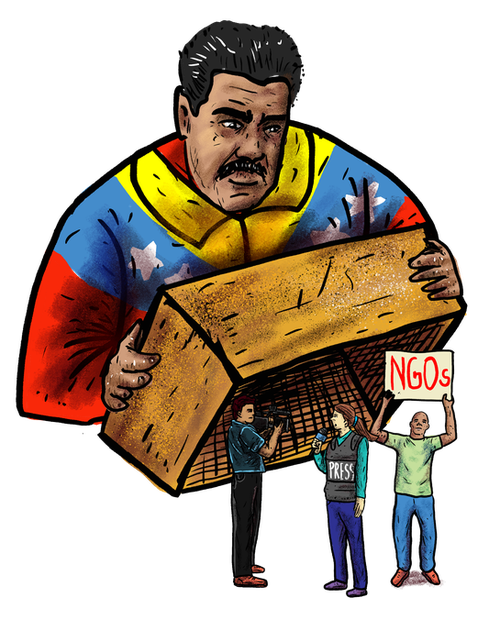
Venezuela’s closed civic space underwent a further deterioration in the context of the disputed 2024 presidential election marred by a lack of transparency and an intensified crackdown on dissent. In March 2024, Venezuela was added to the CIVICUS Monitor Watchlist, which draws attention to countries where there is a serious and rapid decline in respect for civic space, due to the government’s targeting of HRDs and suppression of freedom of expression, highlighted by the arbitrary detention of prominent HRD Rocío San Miguel in February 2024. Government tactics have included arbitrary detentions and enforced disappearances, with violence escalating after the election, with brutal repression of peaceful protests questioning the integrity of the results and demanding transparency and accountability. The approval of the Law for the Control, Regularisation, Performance and Financing of Non-Profit Social Organisations in August 2024 further restricts and potentially criminalises the work of civil society, while moves to introduce an ‘Anti-Fascism’ bill threaten to increase restrictions on freedoms of expression and peaceful assembly.
Civic space has steadily diminished in El Salvador under an extended state of emergency, which has become a key tool for the state to entrench authoritarian practices and suppress fundamental freedoms. Since 2019, President Nayib Bukele’s aggressive campaign against organised crime has been coupled with increasingly restrictive measures that target critics and allow him to consolidate power. Activists, CSOs and journalists face a climate of public intimidation, smear campaigns and vilification, with limited access to information. According to human rights organisations, the past four years have been some of the most challenging.
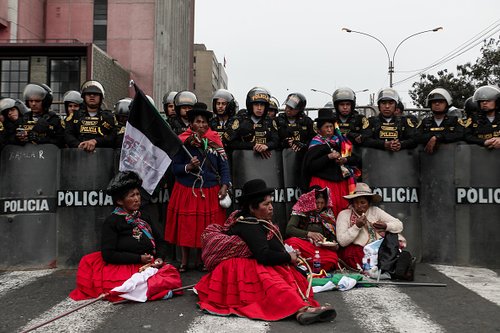
Peru has been downgraded from obstructed to repressed following years of gradual erosion of civic freedoms. A hostile environment for civil society is characterised by escalating violence, including harassment, physical attacks, threats and vilification, from the state and far-right extremist groups. There is pervasive violence in regions plagued by deforestation, illegal mining and narcotrafficking. Indigenous leaders and environmental defenders face increasing risks, with at least two Indigenous Kakataibo leaders killed since December 2023. Journalists are vulnerable to judicial harassment, smear campaigns and physical attacks, particularly when reporting on protests. The repressive conditions are underpinned by widespread impunity.
Only a few countries have taken meaningful steps toward protecting fundamental freedoms, offering limited but important signs of progress. Trinidad and Tobago’s civic space rating has been upgraded from narrowed to open, reflecting improved conditions. Although challenges to press freedom remain, including the handling of defamation and sedition cases, the availability of legal redress has proved crucial for upholding freedom of expression.
Jamaica’s rating has also been upgraded from narrowed to open. Freedom of peaceful assembly is generally respected and no significant incidents were reported in the past year. However, isolated challenges persist, with some protests occasionally becoming violent due to protesters’ actions.
Top Violations
The most common violations of civic freedoms documented in the Americas in 2024 were attacks on journalists, the killing of HRDs, the detention of protesters, disruption of protests and threats against journalists.
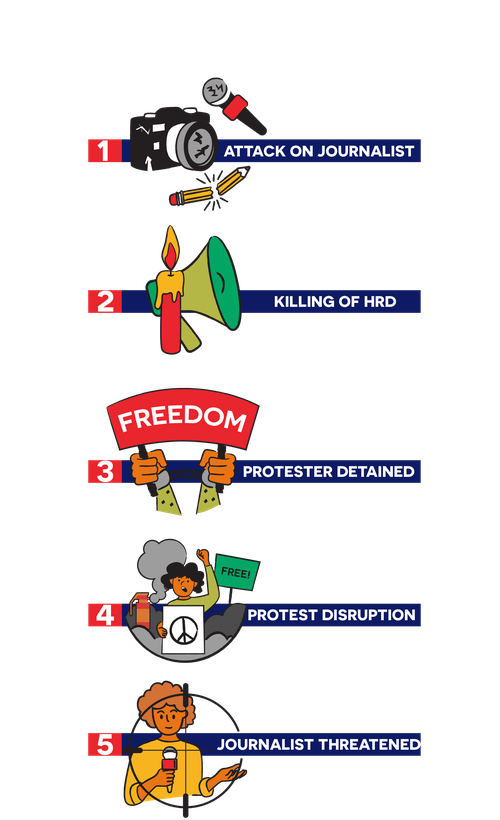
Journalists attacked and threatened
Attacks on journalists were documented in at least 17 countries. Year on year this violation has consistently ranked among the region’s top five, indicating that there is a persistently hostile environment for media and significant risks for journalists. Threats, including death threats, were documented in at least 12 countries, leaving many journalists fearing for their safety and causing some to curb their work.
Journalists are often the target of attacks when covering protests. This was recorded in several countries, including Argentina, Bolivia, Haiti, Mexico, Peru, the USA and Venezuela. Security forces have frequently been identified as the main perpetrators of violence, raising concerns about excessive use of force, including of lethal weapons. In Venezuela, Bolivarian National Guard officers shot Jesús Romero, a reporter with independent media outlet Código Urbe, while he covered a demonstration in Maracay amid a nationwide crackdown on post-election protests in July 2024. Romero’s leg was struck by a bullet, injuring an artery, and he also sustained a buckshot wound to his abdomen.
In several instances security forces have fired rubber bullets and teargas directly at journalists. In Argentina, photojournalist Mariano Dalaison sustained a rubber bullet injury to his face while documenting protests opposing a controversial package of laws proposed by President Milei. The bullet struck him between his eyebrows, causing a serious injury.
In countries where gang violence has surged, journalists and media outlets have become frequent targets of attacks. In Ecuador, following the declaration of a 60-day state of emergency after the escape of a gang leader in January 2024, heavily armed gang members stormed the TC Televisión studio in Guayaquil, interrupting a live broadcast of the El Noticiero news programme. Attackers threatened media workers with firearms, brandished grenades and fired shots, all broadcast live across the country.
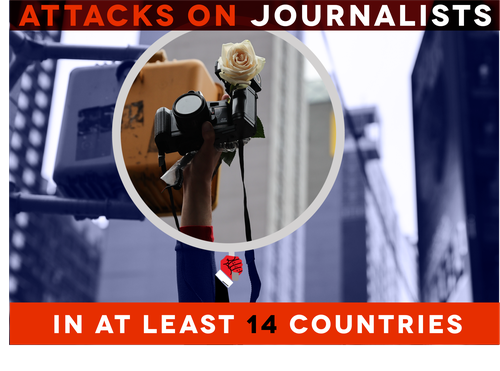
Journalists have been frequent targets of threats for exposing criminal and corrupt activities. Instances were recorded in at least five countries, including Colombia, Ecuador, Mexico, Paraguay and Uruguay. In Uruguay, where civic space is open and such events are rare, two media outlets received threatening messages asking them to stop reporting on the activities in Bolivia of Uruguayan drug trafficker Sebastián Marset.
In Mexico, there are significant gaps and challenges in state-sponsored protection mechanisms, leaving journalists at risk. In May 2024, unidentified assailants drove past the home of journalist Alberto Amaro Jordán in Apizaco, Tlaxcala, shouting death threats at his bodyguards. Amaro, founder of La Prensa de Tlaxcala, has faced threats over several years and is enrolled in a government protection programme.
Journalists are at risk of being killed in some countries, with Colombia, Guyana, Honduras and Mexico among the most dangerous for journalists. Mexico continues to be one of the world’s most lethal countries for journalists. In July 2024, two journalists were killed over two days, and in October 2024, two more were killed within 24 hours.
Human rights defenders killed
In recent years, the Americas have witnessed a disturbing surge in killings of HRDs. In the past year, the region has seen the highest number of killings of HRDs worldwide, with Brazil, Colombia, Guatemala, Honduras, Mexico and Peru the most dangerous countries. Activists working for social justice and peace, environmental and land rights, Indigenous rights and LGBTQI+ rights are being met with lethal reprisals aimed at silencing demands for rights.
There is an ongoing crisis of violence in Colombia. HRDs continue to be targeted amid territorial disputes and entrenched violence by armed groups, as progress on Colombia’s peace process has stalled. Between January and October 2024, civil society reported 148 killings. Most perpetrators of attacks remain unidentified, contributing to a chilling atmosphere of impunity. Colombia accounts for most of the region’s killings of HRDs documented by the CIVICUS Monitor.
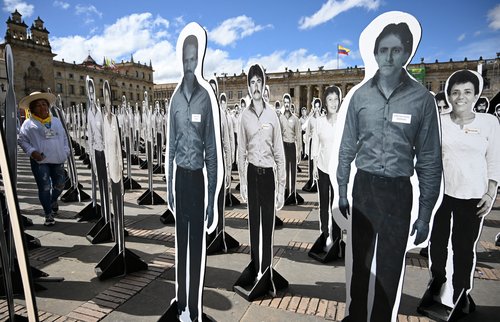
In February 2024, armed assailants entered the home of Ludivia Galindez in Florencia, Caquetá, and shot her shortly after her protection team from the National Protection Unit had dropped her off. Galindez was a leader in Caquetá and a member of the Association of Women for Peace and the Defence of Women’s Rights in Colombia. In March 2024, Dairo Yovani Aquite, an Indigenous leader from the Nasa community in Cauca, was fatally shot by armed assailants while travelling by motorcycle. He had previously reported threats from armed groups. Cauca has seen a surge in violence against HRDs.
In Brazil, Indigenous leaders are leading the fight to protect ancestral lands from encroachment and aggressive development practices that disregard their rights and threaten their communities. This defence comes at a heavy cost, as shown by the murders of Pataxó leaders Lucas Kariri-Sapuyá in December 2023 and Maria Fátima Muniz de Andrade, known as Nega Pataxó, in January 2024. The killings occurred in the context of territorial disputes, and shortly after a congressional debate about a law that aims to curtail Indigenous rights.
Protests repressed and protesters detained
In line with global trends, the Americas saw a sharp rise in the detention of protesters over the past year, indicating a troubling shift in how authorities handle public dissent. Across the region, people continue to turn to protest as a vital means to demand change, voice grievances and hold leaders and corporations accountable. Security forces have increasingly responded by detaining protesters, as documented in at least 15 countries, including Argentina, Canada, Chile, Costa Rica, Panama, Suriname, the USA and Venezuela. Detentions have the intent of sapping protest momentum. Protests opposing conflict or expressing political dissent were more likely to encounter restrictions.
University students across Canada and the USA have established peaceful encampments in solidarity with Palestinians, calling on their institutions to divest from companies associated with Israel. Institutions such as the University of Toronto have pursued legal action to dismantle protest encampments rather than safeguarding the rights of protesters. A July 2024 ruling by the Ontario Superior Court of Justice upheld the University of Toronto’s right to remove protesters from campus property. The court ruled that freedom of expression does not constitute a defence for trespass, prioritising property rights over the right to speak out.
Other universities, including the University of Calgary, have taken action without seeking legal injunctions. In May 2024, riot police dispersed an encampment at the University of Calgary, leading to confrontations where police deployed pepper spray against protesters. Police detained four people on trespass charges, later releasing them with a summons.
Since October 2023, the USA has seen one of the largest displays of support for Palestinian people in recent history, expressed through an unprecedented wave of solidarity protests. This surge in protests has been met with a heavy-handed and violent response. In April and May 2024 alone, authorities detained over 3,200 students, faculty, staff and journalists in nationwide campus raids. University authorities have accused students and organisations showing solidarity with Palestinians of offences such as ‘material support for terrorism’, despite a lack of evidence, and have proposed discriminatory actions such as visa cancellations and deportations.
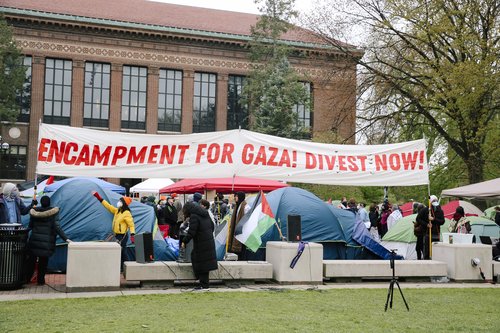
Outrage over economic and political conditions and demands for change have led to mass protests across the Americas. In Argentina, tensions have been particularly high since President Milei took office in December 2023, implementing sweeping economic and political changes. A key flashpoint came on 14 December 2023, when the Ministry of Security introduced Resolution 943/2023, commonly known as the ‘anti-picket’ protocol, to criminalise street protests that obstruct traffic. The policy sparked significant backlash, resulting in violent repression by security forces. In September 2024, Argentina was added to the CIVICUS Monitor Watchlist.
In June 2024, thousands gathered near Argentina’s Congress as the Senate debated an omnibus bill aimed at deregulating industries, privatising key public services, cutting state spending and weakening labour protections. What began as a peaceful demonstration ended in clashes between protesters and security forces. Over 200 people were injured and 35 were detained on charges such as incitement to violence, public intimidation and obstructing legislative proceedings. At the time of writing, a federal court has released 28 detainees due to lack of evidence, criticising sloppy police work and noting insufficient training of security forces.
The CIVICUS Monitor has documented the killing of protesters in at least four countries: Haiti, Mexico, Panama and Venezuela. In Venezuela, the government intensified violence to suppress peaceful protests after the July 2024 election. At least 25 people were killed and over 1,600 detained on terrorism-related charges, including 114 teenagers. There have been frequent reports of systematic violations of due process and ill-treatment in detention.

Country of concern: Haiti
In recent years Haiti has been home to a worsening security crisis, causing the alarming erosion of civic space. Amid a legacy of colonialism, exploitation and decades of political turbulence, the rule of law and human rights have come under attack.
An outbreak of killings in November 2018, known as the La Saline Massacre, marked the start of an intensification of gang violence that continues to this day, as seen in an October 2024 massacre in Pont-Sondé, where gangs killed at least 115 people. Instability was intensified by the 2021 assassination of President Jovenel Moïse. By 2023, the absence of elected officials and weak and corrupt structures had allowed gangs to seize control of vast areas and instil fear through violence and extortion. Gangs have powerful patrons with deep connections to political parties.
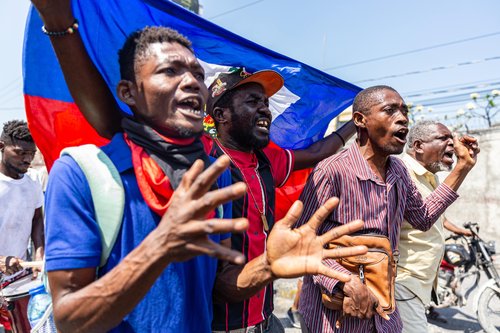
The consequences have been particularly severe for civil society. HRDs frequently receive threats to which authorities pay no attention. Acts of intimidation are common: armed gangs have repeatedly targeted CSOs by attacking their members and premises, particularly in rural areas. The security situation severely constrains CSOs. In November 2023, one organisation was forced to suspend operations temporarily due to rising security threats.
In early 2024, anti-government protests sparked by opposition demands for the resignation of then de facto Prime Minister Ariel Henry were met with excessive force from security forces, leading to deaths and injuries. During this period, at least five journalists sustained injuries
Journalists have been targeted with kidnappings, including the abduction of journalists Lucien Jura in March 2024 and Pierre-Fils Saintamour and his family in November 2023. On 24 July 2024, security agents and local police assaulted journalists and members of human rights organisation Osvatwa Pou Egalite as they documented a hospital strike in Les Cayes. The perpetrators confiscated their phones and issued threats.
HRDs and journalists face violence with impunity in Haiti, with civic space deteriorating as a result.
| COUNTRY | SCORES 2024 | 2024 | 2023 | 2022 | 2021 | 2020 | 2019 | 2018 |
| ANTIGUA AND BARBUDA | 79 | |||||||
| ARGENTINA | 65 | |||||||
| BAHAMAS | 87 | |||||||
| BARBADOS | 95 | |||||||
| BELIZE | 75 | |||||||
| BOLIVIA | 51 | |||||||
| BRAZIL | 52 | |||||||
| CANADA | 82 | |||||||
| CHILE | 80 | |||||||
| COLOMBIA | 38 | |||||||
| COSTA RICA | 77 | |||||||
| CUBA | 16 | |||||||
| DOMINICA | 78 | |||||||
| DOMINICAN REPUBLIC | 76 | |||||||
| ECUADOR | 48 | |||||||
| EL SALVADOR | 45 | |||||||
| GRENADA | 91 | |||||||
| GUATEMALA | 40 | |||||||
| GUYANA | 73 | |||||||
| HAITI | 39 | |||||||
| HONDURAS | 37 | |||||||
| JAMAICA | 84 | |||||||
| MEXICO | 40 | |||||||
| NICARAGUA | 8 | |||||||
| PANAMA | 71 | |||||||
| PARAGUAY | 56 | |||||||
| PERU | 40 | |||||||
| SAINT LUCIA | 88 | |||||||
| ST KITTS AND NEVIS | 85 | |||||||
| ST VINCENT AND THE GRENADINES | 91 | |||||||
| SURINAME | 77 | |||||||
| TRINIDAD AND TOBAGO | 83 | |||||||
| UNITED STATES OF AMERICA | 62 | |||||||
| URUGUAY | 88 | |||||||
| VENEZUELA | 16 |


